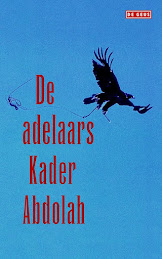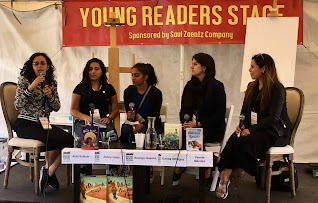Or, Tools to Help You Find Your Middle Grade Voice
By Mina Witteman
In my previous posts about writing in another language than your native tongue and about the art of translation, an important--if not the most important--part of writing kept speaking up: Voice. I shared how a changing the language I write in also changed my voice and the voices of my protagonists. Voice is the one thing that an editorial agent or an editor can't fix. It's yours and yours only. No one speaks like you, no one thinks like you, no one writes like you. And that goes for both the writer's voice and for the character's voices. And yet, voice is what agents and editors are predominantly looking for.
Middle Grade Life
Middle graders are 8- to 12-year-olds. By age 8 most children have moved from learning to read to reading to learn. Their language and literacy skills have improved, as have skills like comprehension and deduction, rational, logical thought and concrete thinking. They understand concepts of space, time and dimension. They use their personal experiences to understand the books they read and the conversations around them. Characters' internal conflicts are typical of what middle grade readers find in their lives. They can recognize the difference between behavior and intent, and they understand how their behavior affects others. They understand concepts of right and wrong. The rule-abiding traits of earlier childhood are cast aside: for this age group rules can be negotiated.
Remembering Your Middle Grade Self
Remember me being flummoxed by being unable to nail my protagonist's Dutch middle grade voice in English? My completely unscientifically, unproven theory is that my middle grade memories that stood at the cradle of the Boreas stories were in Dutch. I think that if we can access those times when we ourselves were as old as our target group, we're on to something. Jack Gantos says in Dead End in Norvelt: "...we have to save the history we have. You never know what small bit of it might change your life---or change the whole world." Or a reader!
So, who were you when you were in your middle grade years? What can you remember and how can you use these memories to help you find your middle grade voice? How can you access your childhood memories? Some of us have been writers from a very young age and kept dairies and journals. Perusing them is a surefire method to bring back memories, as they often not only give you the actual events but also your mindset at the time. That's exactly what we need to build our middle grade voice. Even if the recording seems merely factual, you can often glean the emotion behind it or, reading the memory, feelings will flood back in. That's also how Jack Gantos started. He was in sixth grade when he read his sister's diary. Arguably wrong, but very much in line with an 11- or 12-year-old. After reading, Gantos decided he could write better. He began collecting anecdotes he overheard at school. A favorite place of his was outside the teachers' lounge to listen to their lunchtime conversations. Many of these anecdotes are woven into his stories.
Getting the Memories Out
In NPR's Morning Edition, host Rachel Martin and author Kwame Alexander talk about Where I'm From, a collection of poems by poet and children's author George Ella Lyon, that are based on her memories. In the interview, Kwame mentions that the poem is "often used as a jump-off for kids and adults to share their own remembrances, from family sayings to the smell that bring childhood to life. It's like a time capsule of memories." Kwame recites a stanza from "Where I'm From":
I'm from fudge and eyeglasses
from Imogene and Alafair.
I'm from the know-it-alls
and the pass-it-ons
from Perk up and Pipe down!
I'm from He restoreth my soul
with a cottonball lamb
and ten verses I can say myself
And then Kwame makes own lines:
I am from words and art and books
I am from discipline and hard work
the sound of coins in a jar.
I never kept a diary or journal, but I do have a wealth of memories stored in my head. In quietness, I can easily call them up and transport myself back to a boat during my first sailing lessons from my father; to the first day at a new school in the midst of a school year after moving to another town; in a tree hiding from my mother, reading a book and listening to chatterbox magpies; in the backyard and furious with my neighbor kid who whacked a magpie's nest with nestlings out of a tree to feed his ferrets.
Just like Kwame uses George Ella Lyon's poem, these are deliberate attempts to recall experiences and emotions. Memories can also be triggered by our senses: you smell a scent and, right there and them, you're back in your grandmother's kitchen; you taste a madeleine dipped in tea, like Marcel, Proust's protagonist, and memories come flooding in; you hear a song and think of a lost love; you see a sunset and remember a day too short for all you had wanted to do; you feel a breeze and remember, like I do, the powerful feeling of freedom.
An Exercise
I am not necessarily interested in the memory itself, but I am interested in the emotion that was behind the experience, because that is what will color my middle grade voice and bring it to life. To get there I often write down a memory in first person and present tense, as if I am reliving the experience. Then I rewrite it in third person and past tense. That pushes me out of the story but preserves the emotions that I need to make my middle grade voice believable and relatable to my young readers. Try it! Write down a middle school memory in first person and present tense, drawing on all five senses. Rewrite the memory in third person and past tense, changing the name of the "I" and, if you can, the names of other characters, changing the setting.
And, of course, Learn From the Pros!
Mina Witteman is a Dutch published author, who writes in English and Dutch. In The Netherlands, she has seven middle grade novels out, a Little Golden Book, and some forty short stories in children's magazines and read-aloud anthologies. Her middle grade Boreas en de zeven zeeën (Boreas and the Seven Seas) was a focus title for the 2019 Dutch National Children's Book Week, an honor it shares with the Dutch version of Kate DiCamillo's Raymie Nightingale. In 2022, the same book came out in an educational edition aimed at reluctant readers. Mina lives in hills of North Berkeley, California, and when she looks out the window of her little redwood shoebox, it's like she steps into a painting by Rousseau.






























